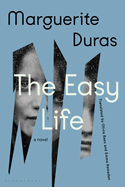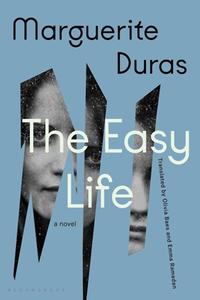
 Nearly 80 years after its publication in France, The Easy Life by Marguerite Duras is now available for the first time in English, thanks to translators Emma Ramadan and Olivia Baes. It's a dark and ruminative novel that displays Duras's talent for creating a memorable narrator and then sustaining considerable tension over the course of what amounts to an extended internal monologue.
Nearly 80 years after its publication in France, The Easy Life by Marguerite Duras is now available for the first time in English, thanks to translators Emma Ramadan and Olivia Baes. It's a dark and ruminative novel that displays Duras's talent for creating a memorable narrator and then sustaining considerable tension over the course of what amounts to an extended internal monologue.
Set in rural France, The Easy Life's story is told by Francine "Françou" Veyrenattes, a self-absorbed 25-year-old woman who lives on a farm with her younger brother, Nicolas, and their parents. The novel opens with a shocking act: Nicolas's violent assault on his uncle Jérôme that inflicts a mortal wound on the older man, though he survives in agony for more than a week. It's a prolonged dying that Françou describes in painful detail.
Françou wrestles with her guilt over provoking the attack by revealing Jérôme's affair with Clémence, the mother of Nicolas's infant child, just one element of the "chaos" (along with "boredom" one of her favorite words) that surrounds her. Layered over this baroque family dynamic are more entanglements involving Françou and Tiène, a visitor to the farm, and Luce Barragues, a woman who attaches herself to Nicolas when Clémence departs without her baby, but whose real quarry is the enigmatic Tiène.
Instead of plumbing the complexities of this romantic quadrilateral, Duras makes a radical shift in the novel's second section. Françou departs, after another family tragedy, for a beach resort on France's Atlantic coast where in isolation she ruminates in almost hypnotic fashion on the events that have brought her there. "I construct my solitude," she muses, "the largest palace of solitude anyone's ever seen, the most impressive. And I both fear it and marvel at it." She grapples with her obsessive thoughts, only to find that "the more I set them aside, the more deafening than ever they return, those chatterboxes," her despair best captured in the moment when her voice briefly shifts from first to second person. Even in this tranquil setting, amid the "blue and hoarse sound of the sea," she becomes enmeshed in another incident involving a sudden fatality.
"I overwhelmed myself with tragedy, it broke out everywhere, from all sides," Françou observes in the novel's final pages, as she struggles to reconcile herself to the prospect of decades of a life shadowed by these events. The Easy Life is anything but easy; it's a compelling portrait of a mind in turmoil and of the relentless, unforgiving demands of a true moral reckoning. --Harvey Freedenberg, freelance reviewer
Shelf Talker: In Marguerite Duras's second novel, a young woman wrestles with the moral implications of several tragic deaths.

